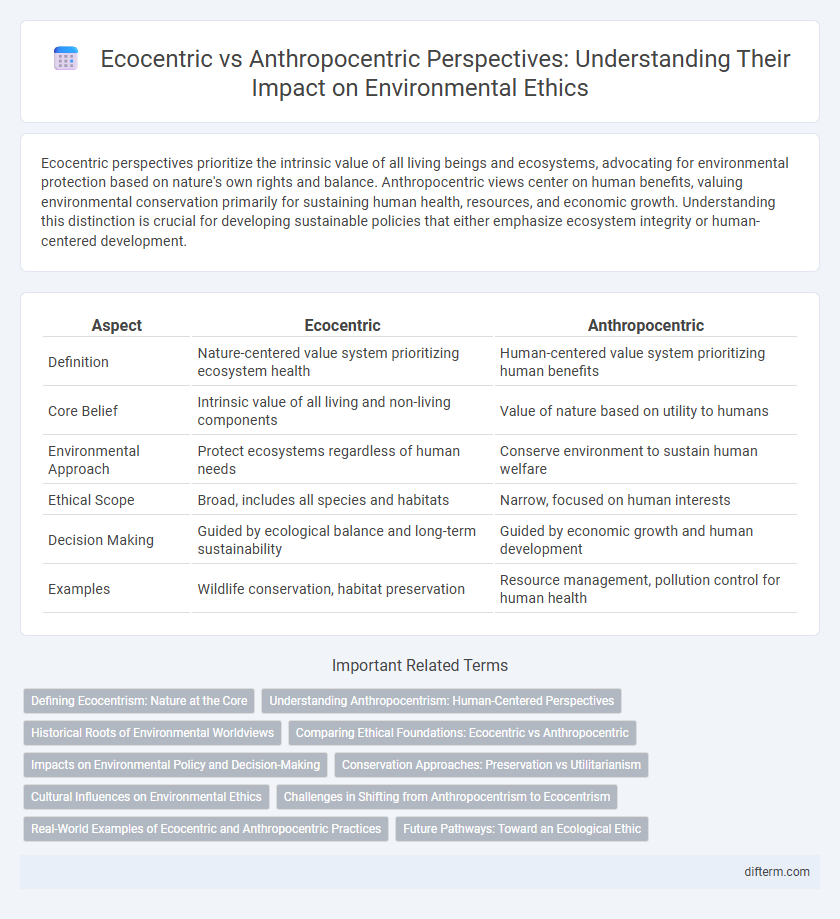Ecocentric perspectives prioritize the intrinsic value of all living beings and ecosystems, advocating for environmental protection based on nature's own rights and balance. Anthropocentric views center on human benefits, valuing environmental conservation primarily for sustaining human health, resources, and economic growth. Understanding this distinction is crucial for developing sustainable policies that either emphasize ecosystem integrity or human-centered development.
Table of Comparison
| Aspect | Ecocentric | Anthropocentric |
|---|---|---|
| Definition | Nature-centered value system prioritizing ecosystem health | Human-centered value system prioritizing human benefits |
| Core Belief | Intrinsic value of all living and non-living components | Value of nature based on utility to humans |
| Environmental Approach | Protect ecosystems regardless of human needs | Conserve environment to sustain human welfare |
| Ethical Scope | Broad, includes all species and habitats | Narrow, focused on human interests |
| Decision Making | Guided by ecological balance and long-term sustainability | Guided by economic growth and human development |
| Examples | Wildlife conservation, habitat preservation | Resource management, pollution control for human health |
Defining Ecocentrism: Nature at the Core
Ecocentrism places intrinsic value on all living and non-living components of the environment, emphasizing the interconnectedness of ecosystems beyond human utility. This worldview contrasts with anthropocentrism by prioritizing the health and stability of natural systems as fundamental to ethical decision-making. Defining ecocentrism involves recognizing nature as an autonomous entity with rights, demanding conservation efforts that sustain biodiversity and ecological processes.
Understanding Anthropocentrism: Human-Centered Perspectives
Anthropocentrism emphasizes human beings as the central or most significant entities in the world, prioritizing human needs and interests over those of other species and ecosystems. This perspective often leads to environmental policies and practices that favor economic growth and resource exploitation to benefit human society. Recognizing anthropocentrism is crucial for addressing environmental challenges by shifting towards more inclusive and sustainable approaches that consider the intrinsic value of nature beyond human utility.
Historical Roots of Environmental Worldviews
Ecocentric and anthropocentric environmental worldviews originate from distinct historical perspectives on human-nature relationships. Ecocentrism traces back to indigenous philosophies and deep ecology movements emphasizing intrinsic value in all living beings and ecosystems. In contrast, anthropocentrism stems from Enlightenment-era humanism, prioritizing human needs and dominion over natural resources.
Comparing Ethical Foundations: Ecocentric vs Anthropocentric
Ecocentric ethics prioritize the intrinsic value of all living organisms and ecosystems, emphasizing the interdependence of species and the preservation of biodiversity. Anthropocentric ethics center on human welfare and interests, evaluating nature primarily based on its utility to humans and economic benefits. This fundamental difference shapes environmental policies, with ecocentrism advocating for ecosystem protection beyond human needs, while anthropocentrism often balances environmental concerns with human development goals.
Impacts on Environmental Policy and Decision-Making
Ecocentric perspectives prioritize the intrinsic value of ecosystems, influencing environmental policies to emphasize biodiversity protection and sustainable resource management, often leading to stricter conservation regulations. In contrast, anthropocentric views center human needs and economic growth, shaping decision-making that balances environmental concerns with development goals, sometimes resulting in more flexible regulatory frameworks. These divergent approaches impact policy outcomes, affecting how natural resources are allocated, protected, or exploited on national and global scales.
Conservation Approaches: Preservation vs Utilitarianism
Ecocentric conservation emphasizes preserving ecosystems and biodiversity for their intrinsic value, advocating minimal human interference to maintain natural processes. Anthropocentric utilitarianism supports conservation practices that prioritize resource use and ecosystem services for human benefit, promoting sustainable exploitation. These contrasting approaches shape environmental policies by either focusing on inherent ecological integrity or maximizing long-term human welfare through managed resource utilization.
Cultural Influences on Environmental Ethics
Cultural influences shape environmental ethics by determining whether societies adopt ecocentric or anthropocentric worldviews, with many Indigenous cultures emphasizing interconnectedness between humans and nature, promoting ecocentrism. In contrast, Western industrial societies often prioritize anthropocentric values, viewing nature primarily as a resource for human use and economic growth. These cultural perspectives significantly impact environmental policies, conservation efforts, and sustainability practices worldwide.
Challenges in Shifting from Anthropocentrism to Ecocentrism
Transitioning from anthropocentrism to ecocentrism faces significant challenges including entrenched economic systems prioritizing human benefit, policy frameworks lacking integration of ecological values, and pervasive cultural perceptions that regard nature primarily as a resource. Resistance arises from industries dependent on resource extraction and consumption patterns tied to human-centered development goals. Overcoming these obstacles requires reframing environmental governance, promoting interdisciplinary education, and embedding intrinsic ecological worth into legislation and societal norms.
Real-World Examples of Ecocentric and Anthropocentric Practices
Ecocentric practices are exemplified by initiatives such as New Zealand's commitment to preserving indigenous forests and wildlife through the Predator Free 2050 program, which prioritizes ecosystem health over human convenience. Anthropocentric approaches are evident in urban development projects like Singapore's Gardens by the Bay, designed to enhance human living conditions while incorporating green infrastructure to mitigate environmental impact. These examples highlight the contrast between prioritizing ecological integrity versus human benefits within environmental management strategies.
Future Pathways: Toward an Ecological Ethic
Future pathways toward an ecological ethic emphasize shifting from anthropocentric values, which prioritize human needs, to ecocentric perspectives that recognize the intrinsic worth of all living beings and ecosystems. Integrating ecocentrism into environmental policies promotes sustainable resource management, biodiversity conservation, and resilience against climate change. This transformation requires redefining human responsibility as part of a broader ecological community rather than dominators of nature.
ecocentric vs anthropocentric Infographic

 difterm.com
difterm.com